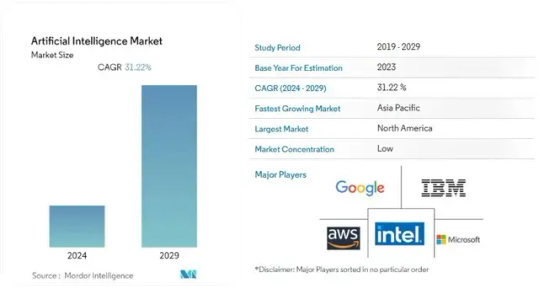#Cloud Managed Services Market Growth
Text
#Cloud Managed Services Market Report#Cloud Managed Services Industry Report#Cloud Managed Services Market#Cloud Managed Services Market Share#Cloud Managed Services Market Size#Cloud Managed Services Industry#Cloud Managed Services Market Growth#Cloud Managed Services Market Trends#Cloud Managed Services Market Analysis
0 notes
Text
#Managed Cloud as a Service Market#Managed Cloud as a Service Market Size#Managed Cloud as a Service Market Trends#Managed Cloud as a Service Market Growth#Managed Cloud as a Service Market Analysis
0 notes
Text
Unleashing the Power of Salesforce: An Introduction to the World's Leading CRM Platform
Salesforce is a cloud-based customer relationship management (CRM) platform that is transforming the way businesses and organizations engage with their customers. With a wide range of features and capabilities, Salesforce is the world's leading CRM platform and is used by businesses of all sizes and industries.
One of the key benefits of Salesforce is that it is highly customizable. This means that you can configure the platform to meet the specific needs of your business or organization. Whether you need to manage your sales process, automate your customer service operations, or streamline your marketing campaigns, Salesforce has you covered.
Another benefit of Salesforce is that it is highly scalable. This means that you can start with a basic configuration and add more capabilities as your business grows. This makes it easy to grow your use of Salesforce over time and take advantage of its full range of features and capabilities.
In addition, Salesforce has a thriving ecosystem of partners and developers who are creating a wide range of integrations and applications that extend the capabilities of the platform. This means that you can easily add new capabilities and integrate Salesforce with other tools and systems that you are using.
In conclusion, Salesforce is a powerful platform that is transforming the way businesses and organizations engage with their customers. With its wide range of features and capabilities, and its highly customizable and scalable nature, Salesforce is the ideal platform for businesses of all sizes and industries. So, if you're looking to take your customer engagement to the next level, consider unleashing the power of Salesforce.
#Salesforce#CRM#cloud computing#customer relationship management#sales management#automation#customer service#marketing#integrations#platform#business growth#customization#scalability#ecosystem#partners#developers
0 notes
Text
Embrace the Future with AI 🚀

The AI industry is set to skyrocket from USD 2.41 trillion in 2023 to a projected USD 30.13 trillion by 2032, growing at a phenomenal CAGR of 32.4%! The AI market continues to experience robust growth driven by advancements in machine learning, natural language processing, and cloud computing. Key industry player heavily invests in AI to enhance their product offerings and gain competitive advantages.
Here is a brief analysis of why and how AI can transform businesses to stay ahead in the digital age.
Key Trends:
Predictive Analytics: There’s an increasing demand for predictive analytics solutions across various industries to leverage data-driven decision-making.
Data Generation: Massive growth in data generation due to technological advancements is pushing the demand for AI solutions.
Cloud Adoption: The adoption of cloud-based applications and services is accelerating AI implementation.
Consumer Experience: Companies are focusing on enhancing consumer experience through AI-driven personalized services.
Challenges:
Initial Costs: High initial costs and concerns over replacing the human workforce.
Skill Gap: A lack of skilled AI technicians and experts.
Data Privacy: Concerns regarding data privacy and security.
Vabro is excited to announce the launch of Vabro Genie, one of the most intelligent SaaS AI engines. Vabro Genie helps companies manage projects, DevOps, and workflows with unprecedented efficiency and intelligence. Don’t miss out on leveraging this game-changing tool!
Visit www.vabro.com
#ArtificialIntelligence#TechTrends#Innovation#Vabro#AI#VabroGenie#ProjectManagement#DevOps#Workflows#Scrum#Agile
3 notes
·
View notes
Text
Best 10 Business Strategies for year 2024
In 2024 and beyond, businesses will have to change with the times and adjust their approach based on new and existing market realities. The following are the best 10 business approach that will help companies to prosper in coming year
1. Embrace Sustainability
The days when sustainability was discretionary are long gone. Businesses need to incorporate environmental, social and governance (ESG) values into their business practices. In the same vein, brands can improve brand identity and appeal to environmental advocates by using renewable forms of energy or minimizing their carbon footprints.
Example: a fashion brand can rethink the materials to use organic cotton and recycled for their clothing lines. They can also run a take-back scheme, allowing customers to return old clothes for recycling (not only reducing waste but creating and supporting the circular economy).
2. Leverage AI

AI is revolutionizing business operations. Using AI-fuelled solutions means that you can automate processes, bring in positive customer experiences, and get insights. AI chatbots: AI can be utilized in the form of a conversational entity to support and perform backend operations, as well.
With a bit more specificity, say for example that an AI-powered recommendation engine recommends products to customers based on their browsing history and purchase patterns (as the use case of retail). This helps to increase the sales and improve the shopping experience.
3. Prioritize Cybersecurity
Cybersecurity is of utmost important as more and more business transitions towards digital platforms. Businesses need to part with a more substantial amount of money on advanced protective measures so that they can keep sensitive data private and continue earning consumer trust. Regular security audits and training of employees can reduce these risks.
Example: A financial services firm may implement multi-factor authentication (MFA) for all online transactions, regularly control access to Internet-facing administrative interfaces and service ports as well as the encryption protocols to secure client data from cyberattacks.
4. Optimizing Remote and Hybrid Working Models

Remote / hybrid is the new normal Remote teams force companies to implement effective motivation and management strategies. Collaboration tools and a balanced virtual culture can improve productivity and employee satisfaction.
- Illustration: a Tech company using Asana / Trello etc. for pm to keep remote teams from falling out of balance. They can also organise weekly team-building activities to keep a strong team spirit.
5. Focus on Customer Experience
Retention and growth of the sales follow-through can be tied to high quality customer experiences. Harness data analytics to deepen customer insights and personalize product offers making your marketing campaigns personal: a customer support that is responsive enough can drive a great level of returning customers.
Example – For any e-commerce business, you can take user experience feedback tools to know about how your customers are getting along and make necessary changes. Custom email campaigns and loyalty programs can also be positively associated with customer satisfaction and retention.
6. Digitalization Investment

It is only the beginning of digital transformation which we all know, is key to global competitiveness. For streamlining, companies have to adopt the use advanced technologies such as Blockchain Technology and Internet of Things (IoT) in conjunction with cloud computing.
IoT example : real-time tracking and analytics to optimize supply chain management
7. Enhance Employee Skills
Develop Your Employees: Investing in employee development is key to succeeding as a business. The training is provided for the folks of various industries and so employees can increase their skills that are needed to work in a certain company. Employee performance can be enhanced by providing training programs in future technology skills and soft skills and job satisfaction.
Example: A marketing agency can host webinars or create courses to teach people the latest digital marketing trends and tools This can help to keep employees in the know which results in boosting their skills, making your campaigns successful.
8. Diversify Supply Chains

The ongoing pandemic has exposed the weaknesses of global supply chains. …diversify its supply base and promote the manufacturing of drugs in Nigeria to eliminate total dependence on a single source. In return, this approach increases resilience and reduces exposure to the risks of supply chain interruption.
- E.g., a consumer electronics company can source components from many suppliers in various regions. In so doing, this alleviates avoidable supply chain interruptions during times of political tensions or when disasters hit.
9. Make Decisions Based on Data
A business database is an asset for businesses. By implementing data, they allow you to make decisions based on the data that your analytics tools are providing. For example, sales analysis lets you track trends and better tailor your goods to the market.
Example: A retail chain can use data analytics to find out when a customer buys, and it change their purchasing policies. This can also reduce overstock and stockouts while overall, increasing efficiency.
10. Foster Innovation

Business Growth Innovation is Key A culture of creativity and experimentation should be established in companies. Funding R&D and teaming with startups can open many doors to both solve problems creatively but also tap into new markets.
Example: A software development firm could create an innovation lab where team members are freed to work on speculative projects. Moreover, work with start-ups on new technologies and solutions.
By adopting these strategies, businesses can navigate the turbulence for 2024 and roll up market — progressive.AI with an evolving dynamic market, being ahead of trends and updated is most likely will help you thrive in the business landscape.
#ai#business#business strategy#business growth#startup#fintech#technology#tech#innovation#ai in business
2 notes
·
View notes
Text
In the era of digital transformation, cloud computing has emerged as a pivotal technology, reshaping the way businesses operate and innovate. Pune, a burgeoning IT and business hub, has seen a significant surge in the adoption of cloud services, with companies seeking to enhance their efficiency, scalability, and agility. Zip Crest stands at the forefront of this revolution, offering comprehensive cloud computing services tailored to meet the diverse needs of businesses in Pune
The Importance of Cloud Computing
Cloud computing enables organizations to leverage a network of remote servers hosted on the internet to store, manage, and process data, rather than relying on local servers or personal computers. This shift provides several key benefits:
- Scalability: Businesses can easily scale their operations up or down based on demand, without the need for significant capital investment in hardware.
- Cost Efficiency: Cloud services operate on a pay-as-you-go model, reducing the need for substantial upfront investment and lowering overall IT costs.
- Accessibility: Cloud computing allows access to data and applications from anywhere, at any time, fostering remote work and collaboration.
- Security: Leading cloud service providers offer robust security measures, including encryption, access controls, and regular security audits, to protect sensitive data.
Zip Crest: Leading Cloud Computing Services in Pune
Zip Crest is committed to empowering businesses in Pune with cutting-edge cloud computing solutions. Our services are designed to address the unique challenges and opportunities that come with the digital age. Here’s how we can transform your business operations:
1. Cloud Strategy and Consulting:
At Zip Crest, we begin by understanding your business objectives and IT infrastructure. Our experts then craft a bespoke cloud strategy that aligns with your goals, ensuring a seamless transition to the cloud and maximizing the benefits of cloud technology.
2. Infrastructure as a Service (IaaS):
Our IaaS offerings provide businesses with virtualized computing resources over the internet. This includes virtual machines, storage, and networking capabilities, allowing you to build and manage your IT infrastructure without the need for physical hardware.
3. Platform as a Service (PaaS):
With our PaaS solutions, developers can build, deploy, and manage applications without worrying about the underlying infrastructure. This accelerates development cycles, enhances productivity, and reduces time to market.
4. Software as a Service (SaaS):
Zip Crest offers a range of SaaS applications that can streamline your business processes. From customer relationship management (CRM) to enterprise resource planning (ERP), our cloud-based software solutions are designed to improve efficiency and drive growth.
5. Cloud Migration Services:
Transitioning to the cloud can be complex. Our cloud migration services ensure a smooth and secure migration of your applications, data, and workloads to the cloud, minimizing downtime and disruption to your business operations.
6. Managed Cloud Services:
Once your infrastructure is on the cloud, ongoing management is crucial to ensure optimal performance and security. Our managed cloud services provide continuous monitoring, maintenance, and support, allowing you to focus on your core business activities.

Why Choose Zip Crest?
Choosing Zip Crest for your cloud computing needs comes with several advantages:
- Expertise: Our team of certified cloud professionals brings extensive experience and deep knowledge of cloud technologies.
- Customized Solutions: We understand that every business is unique. Our solutions are tailored to meet your specific requirements and objectives.
-Proactive Support: We offer 24/7 support to ensure that your cloud infrastructure is always running smoothly and efficiently.
- Security Focus: Security is at the core of our services. We implement robust security measures to protect your data and applications from threats.
Conclusion
In conclusion, cloud computing is transforming the way businesses operate, offering unprecedented levels of flexibility, scalability, and efficiency. Zip Crest is dedicated to helping businesses in Pune harness the power of the cloud to achieve their goals and stay competitive in today’s fast-paced digital landscape. By partnering with Zip Crest, you can ensure that your business is well-equipped to navigate the complexities of cloud computing and reap its many benefits. Embrace the future of technology with Zip Crest and revolutionize your business operations with our top-tier cloud computing services.
Get In Touch
Website: https://zipcrest.com/
Address: 13, 4th Floor, A Building City Vista Office Park Fountain Road Karadi Pune Maharashtra 411014
Email: [email protected] / [email protected]
Call: +912049330928 / 9763702645 / 7020684182
2 notes
·
View notes
Text
A Comprehensive Guide to the Top Industries Attracting FDI in India

India has emerged as one of the most attractive destinations for Foreign Direct Investment (FDI) in recent years, thanks to its robust economic growth, favorable demographics, and ongoing policy reforms. FDI plays a crucial role in stimulating economic development by bringing in capital, technology, and expertise. In this comprehensive guide, we will delve into the top industries that are attracting FDI in India.
1. Information Technology (IT) and Software Services:
India's IT industry has been a pioneer in attracting FDI, fueling the country's economic growth and creating millions of jobs. With a large pool of skilled IT professionals, cost-effective services, and a conducive business environment, India continues to be a global hub for software development, IT outsourcing, and business process outsourcing (BPO).
India's Information Technology (IT) and software services industry have been pivotal in attracting Foreign Direct Investment (FDI) due to several key factors:
1. Skilled Workforce:
India boasts a vast pool of highly skilled IT professionals, including software engineers, developers, and project managers. The country's education system emphasizes STEM (Science, Technology, Engineering, and Mathematics) fields, producing a large number of graduates with expertise in computer science and information technology. This skilled workforce is instrumental in delivering high-quality software development, IT outsourcing, and business process outsourcing (BPO) services to clients worldwide.
2. Cost-Effectiveness:
The cost of labor in India is significantly lower compared to developed countries, making it an attractive destination for outsourcing IT projects and services. Foreign companies can leverage India's cost-effective labor market to reduce their operational expenses while maintaining high standards of quality and efficiency. This cost advantage has been a major driver for multinational corporations to set up offshore development centers and service delivery hubs in India.
3. Conducive Business Environment:
India offers a conducive business environment for IT companies, characterized by liberalized policies, supportive government initiatives, and a well-established legal framework. The government has implemented various reforms to promote ease of doing business, simplify regulatory procedures, and encourage foreign investment in the IT sector. Additionally, initiatives such as Digital India and Make in India have further propelled the growth of the IT industry by fostering innovation, entrepreneurship, and technology adoption.
4. Global Reputation:
Over the years, India has built a strong reputation as a leading destination for IT and software services globally. Indian IT companies have demonstrated expertise in delivering cutting-edge solutions, leveraging emerging technologies, and meeting the diverse needs of clients across industries. This reputation has attracted multinational corporations to partner with Indian firms, outsource IT projects, and establish long-term collaborations for software development, maintenance, and support services.
5. Innovation and R&D:
India's IT industry is not just about cost arbitrage; it is also a hub for innovation, research, and development. Many global technology firms have set up innovation centers, research labs, and technology incubators in India to tap into the country's talent pool and drive innovation. These centers focus on developing next-generation technologies, conducting R&D activities, and creating intellectual property in areas such as artificial intelligence, machine learning, blockchain, and cloud computing.
2. Telecommunications:
India's telecommunications sector has witnessed significant FDI inflows, driven by the rapid expansion of mobile and internet services. With a massive consumer base and increasing smartphone penetration, telecom companies are investing heavily in network infrastructure, spectrum auctions, and digital technologies to capitalize on the growing demand for data services.
India's telecommunications sector has emerged as a prominent recipient of Foreign Direct Investment (FDI) due to several key factors:
1. Expanding Market Potential:
India has one of the largest telecommunications markets in the world, with over a billion mobile subscribers and rapidly increasing internet penetration. The country's vast population, growing middle class, and rising disposable incomes have fueled the demand for voice, data, and digital services across urban and rural areas. This immense market potential offers lucrative opportunities for telecom companies to invest in network infrastructure, spectrum allocation, and innovative services to cater to the diverse needs of consumers.
2. Mobile Revolution:
India has witnessed a mobile revolution in recent years, driven by affordable smartphones, competitive tariffs, and widespread adoption of mobile internet services. The proliferation of mobile devices has transformed communication, commerce, and entertainment, creating new business models and revenue streams for telecom operators. Foreign investors recognize India's mobile-first market dynamics and are keen to capitalize on the growing demand for voice calls, messaging apps, mobile data, and value-added services.
3. Digital Connectivity:
The government's Digital India initiative aims to bridge the digital divide and promote inclusive growth by ensuring broadband connectivity to all citizens. This ambitious program has spurred investments in fiber-optic networks, 4G/5G infrastructure, and rural broadband initiatives to enhance digital connectivity and enable access to digital services in remote areas. Foreign telecom companies view India's digital transformation as an opportunity to deploy advanced technologies, improve network coverage, and deliver high-speed internet services to underserved communities.
4. Spectrum Auctions:
Spectrum is a critical asset for telecom operators to expand their network capacity, improve service quality, and offer new services to customers. India's spectrum auctions provide an opportunity for telecom companies to acquire additional spectrum bands and strengthen their market position. Foreign investors participate in these auctions to acquire spectrum licenses and invest in network upgrades, spectrum refarming, and technology modernization to enhance their competitiveness in the market.
5. Convergence of Services:
The convergence of telecommunications with other sectors such as media, entertainment, and technology is driving investment opportunities in integrated services and content delivery platforms. Foreign telecom operators are exploring partnerships, mergers, and acquisitions with content providers, OTT (Over-the-Top) platforms, and digital media companies to offer bundled services, streaming content, and personalized experiences to subscribers.
6. Policy Reforms:
The Indian government has introduced several policy reforms to liberalize the telecom sector, attract foreign investment, and promote healthy competition. Initiatives such as National Digital Communications Policy (NDCP), ease of doing business reforms, and regulatory clarity have created a favorable investment climate for telecom companies. Foreign investors are encouraged by the government's commitment to reforming regulations, promoting innovation, and fostering a vibrant telecom ecosystem in India.
3. Automobiles and Automotive Components:
The Indian automotive industry has attracted substantial FDI from global automakers and component manufacturers seeking to establish manufacturing facilities, R&D centers, and distribution networks. India's competitive manufacturing costs, skilled workforce, and improving infrastructure have positioned it as a key player in the global automotive market.
4. Pharmaceuticals and Healthcare:
The pharmaceutical sector in India has been a magnet for FDI due to its strong regulatory framework, large market potential, and cost advantages in drug manufacturing. Foreign pharmaceutical companies are investing in research collaborations, production facilities, and distribution networks to tap into India's growing healthcare needs and leverage its expertise in generic drugs.
5. Renewable Energy:
India's ambitious renewable energy targets and supportive government policies have attracted significant FDI inflows into the sector. Foreign investors are investing in solar, wind, hydro, and biomass projects, driven by India's vast renewable energy potential, favorable regulatory environment, and growing demand for clean energy solutions.
6. Retail and E-Commerce:
India's retail and e-commerce sector has witnessed a surge in FDI with the liberalization of FDI policies and the rapid growth of online shopping. Global retail giants are partnering with Indian companies or establishing their own operations to tap into the country's burgeoning consumer market and rising middle-class population.
7. Real Estate and Construction:
The Indian real estate sector continues to attract FDI, driven by urbanization, infrastructure development, and demand for commercial and residential properties. Foreign investors are participating in joint ventures, development projects, and real estate investment trusts (REITs) to capitalize on India's growing urban centers and infrastructure needs.
8. Financial Services:
India's financial services industry is experiencing a steady influx of FDI, driven by liberalization measures, digital transformation, and increasing investor interest. Foreign banks, insurance companies, and fintech startups are expanding their presence in India to cater to the growing demand for banking, insurance, and digital payment services.
9. Food Processing:
The food processing sector in India has attracted FDI due to its vast agricultural resources, changing consumer preferences, and government incentives. Foreign companies are investing in food processing plants, cold chains, and distribution networks to meet the rising demand for processed and packaged food products in India.
10. Infrastructure:
India's infrastructure sector offers immense opportunities for FDI across various segments such as transportation, energy, and urban development. Foreign investors are participating in public-private partnerships (PPPs), infrastructure projects, and investment funds to address India's infrastructure gaps and support its economic growth.
In conclusion, India offers a diverse range of investment opportunities across various industries, making it an attractive destination for FDI. With a growing economy, favorable demographics, and ongoing policy reforms, India continues to attract foreign investors seeking high returns and long-term growth prospects. However, investors need to navigate regulatory challenges, market dynamics, and cultural nuances to succeed in India's competitive business landscape.
This post was originally published on: Foxnangel
#fdi in india#fdi investment in india#foreign invest in india#foreign direct investment#it industry#foreign companies#renewable energy#green energy#foxnangel#invest in india
2 notes
·
View notes
Text
The Role of Data Analytics Consulting in Business Growth
Professional data analysts guide corporate clients in modifying operations, attracting customers, and solving business problems. Therefore, they can assist brands in increasing operational efficiency for better profit margins and crafting exceptional growth strategies. At the same time, integrating new tech advancements like large language models (LLMs) empowers analytics consultants to process qualitative data for comprehensive insights. This post will elaborate on the crucial role of data analytics consulting in business growth and competitive resilience.
What is Data Analytics?
Data analytics employs computer-aided statistical models to discover reliable industry trends, competitor tactics, and consumer insights. Its input datasets comprise consumer purchase history, supply chain details, and regional market entry challenges.
A consulting analyst might utilize proprietary and open-source programs to develop statistical models and flexible reports to deliver insights based on clients’ instructions. Therefore, experts in data analytics consulting services will find the best approach to cost reduction without losing data integrity. They might also help share the digital governance liabilities amid the rise of privacy and investor confidentiality regulations.
Understanding the Role of Data Analytics Consulting in Business Growth
1| Creating a Data Strategy to Accomplish Business Goals
Relevant data is essential for responsible decision-making, clever milestone determination, and strategy innovation. Data analytics allows organizations to check how a data point relates to its long-term vision and performance.
For instance, prioritizing tangible results helps make reports more impactful. Eliminating data points that do not align with business goals can help reduce resource consumption for storage and visualization. After all, streamlined computing is a prerequisite for operational efficiency.
2| Forecasting Scenarios for Risk Assessment and Mitigation
Data analysts interpolate data points to estimate the missing values in a database. Likewise, they leverage machine learning (ML) models to offer predictive analytics consulting services for revenue, risk, and industry projections.
Related forecasting report creation programs require powerful computing hardware. Otherwise, enterprises use cloud platforms for scalability and expert-assisted tech maintenance. Letting a data analyst team oversee these developments will also enable brands to benefit from outsider perspectives during risk or resilience management.
3| Making Reports More User-Friendly with Precise Performance Insights
Complex and over-tabulated reports make employees spend more time performing standard tasks like sharing a record or comparing identical series. Data analytics consultants can revise reporting methods and presentation styles to boost the ease of navigation. They will guide your team in efficiently using recognized and emerging analytical tools.
Consultants must also demonstrate command over performance metrics monitoring through straightforward, real-time updates. When they quickly capture anomalies, promptly tracing and rectifying inefficiencies becomes possible.
3| Gathering Relevant Intelligence
Data quality managers consider relevance to business objectives essential for responsible decision-making and preventing wasteful resource usage. Therefore, experienced data analytics firms refrain from employing data mining methods without adequate programming for relevance-based filtering.
When you store irrelevant business intelligence (BI), you increase the risk of slowing data sorting and query-led quick retrieval. After all, your IT resources must scan vast datasets before providing the best output or insight. The related role of analytics consulting in business growth encompasses devising methods to restrict irrelevant BI processing.
4| Finding Unique Customer Experience Insights
Several consultants offer customer analytics comprising engagement metrics and customer experience (CX) enhancement ideas. They can also evaluate whether a customer will help increase brand awareness through word-of-mouth promotions.
Companies can leverage heatmaps and website engagement metrics to ascertain user interactions and intents. For instance, many consumers prefer surfing the web and reviewing businesses’ online presence for informational and commercial intent. You want to customize landing pages to match the intent and design programs based on frequent usage for CX improvements. Telemetry and usage analytics specialists will help your designers test and optimize the required elements.
5| Helping Manage Workers and Data Culture
Human resource insights describing how employees contribute to organizational initiatives allow managers to reward the top performers. Simultaneously, they can determine which employees need further guidance on efficient workflows and team coordination.
Examining employee performance through ML-assisted analytics necessitates secure data pipelines because employees’ personally identifiable information (PII) also attracts cyber threats. Consider identity theft attackers stealing and forging virtual IDs to hijack enterprise IT systems for corporate espionage.
Therefore, you are better off collaborating with established human resource analysts and data culture veterans. They can facilitate comprehensive insights without hurting your company’s governance standards.
6| Accelerating Innovation and Monitoring Patents
A company’s intellectual property (IP) rights demonstrate its domain expertise and unlock additional revenue through licensing or sublicensing regimes. However, as markets mature, multiple brands will inevitably promise identical or commoditized offerings. This situation makes it harder to differentiate these brands based on standard specifications.
Innovation engineering, a discipline inspired by the systems approach for hybrid tech tools, is essential to making your branded offerings attract investments and demand. At the same time, data analytics consulting is indispensable for uncovering innovation opportunities to ensure clients’ business growth. It reduces the time spent tracking registered patents and predicting legal conflicts in securing IP rights.
The Methods in Data Analytics for Steady Business Growth
Time series analysis describes a business’s past performance and forecasts future growth potential. Furthermore, you can apply it to market intelligence, competitor insights, and investor relations.
Regression analysis establishes or investigates the relationship between dependent and independent variables to create statistical models. These models can later help explore specific predictions.
Cluster analysis often groups data points based on similar attributes to streamline conditional sorting, visualization, prioritization, and multi-model methods.
Meanwhile, factor analysis emphasized data reduction to highlight latent variables. These variables explain the underlying data structure, informing data leaders’ strategies for efficient modeling.
Predictive and prescriptive analyses deliver scenario simulations. You want to define constraints related to favorable and unfavorable decision outcomes. Next, exploring the risk-reward aspects will help discard potentially harmful decisions or strategies. Prescriptive methods give risk mitigation ideas concerning internal and external threats.
Conclusion
Data-centric business growth depends on responsible data source selection, safe data storage, fast validation, and short time-to-insight (TTI). Accordingly, professional data analysts recognize these requirements, sharpening their skills and augmenting their toolkits to deliver smart insights and meet client expectations.
A supply chain analytics expert will help reduce the delays between material acquisition, production, inventory replenishment, remote delivery, and final distribution. At the same time, a human resource analyst categorizes employees and suppliers based on their key performance indicators (KPIs). A financial analyst can provide practical cost reduction recommendations, and a risk analyst will devise resilience-ensuring mitigation strategies.
As a result, leaders must identify what type of data analytics consulting role will let them accomplish business growth objectives for the given quarter. Do they want to solve a problem involving in-house operations or plan to enter a new market? Similar considerations will impact how you select analytics partners and tools. This process might overwhelm you, indicating a need for experts’ oversight from the beginning till the project completion.
3 notes
·
View notes
Text
Smart Growth: Cost-Saving Expansion Tactics for Startups

For any growing startup, scaling up in a cost-effective way is a dream and a dilemma. These young businesses aim to boost their reach and operations. The big question is: Can they increase their team size without burning through their budget? This is where staff augmentation comes in. It's a practical, flexible method that lets startups grow without breaking the bank.
A Look at Startup Expansion Pitfalls
Take a fictional startup, ByteWave, as a case in point. Three university pals had a fantastic idea for a cloud-based service and ByteWave was born. After a year, their user base ballooned to 50,000. This explosive growth brought a heap of operational headaches. ByteWave's tiny 12-member team was swamped, battling to stay afloat amidst demands for customer support, software updates, and fresh feature rollouts.
Traditional hiring seemed the logical move. However, it's a costly option. The Society for Human Resource Management estimates the average cost of recruiting a new U.S. worker is $4,129, taking an average of 42 days. For a startup like ByteWave, this approach was simply out of reach in terms of time and budget.
The Benefits of Staff Augmentation
Staff augmentation is a far more efficient solution. It gives startups the flexibility to temporarily hire skilled personnel for key roles. ByteWave could quickly bring in specialist developers and customer service agents for specific projects. This gave the founders the ability to dynamically scale their team, tackling particular problems without the delays and costs of full-time recruitment.
A Smart Financial Move
Staff augmentation brings significant savings. Deloitte's research shows businesses can save as much as 30% in labor costs by adopting flexible staffing models. These cost cuts result from reduced essential overheads like benefits, office space, and training costs. Plus, it speeds up time-to-market. Deloitte's study also discovered projects are completed 20-25% quicker with staff augmentation, giving startups a crucial competitive edge.
Success Stories
Numerous real-world examples demonstrate how startups have used staff augmentation effectively:
Airbnb: To boost user appeal, Airbnb brought in freelance photographers to produce quality property listings, enhancing the platform's appeal without having to recruit full-time photographers.
Slack: During a critical period of rapid growth, Slack used remote contractors to provide 24/7 customer support, avoiding the costs of a large, permanent team.
Uber: Expanding into new locations, Uber used local contractors for tasks such as driver onboarding and market research, allowing fast growth without the long-term overheads of permanent local staffing.
Steps to Implement Staff Augmentation
If you're a startup considering staff augmentation, follow these practical steps:
Be Transparent: Define the needed skills and roles. This helps you find the right talent.
Choose Wisely: Partner with reliable staffing agencies or platforms that are familiar with your industry. They can quickly hook you up with vetted professionals.
Foster a Team Spirit: Treat augmented staff as integral team members. Make sure they attend meetings, have the necessary tools and keep communication lines open.
Be Clear: Set out the scope, deadlines, and deliverables for each project. This ensures all parties are on the same page and promotes effective collaboration.
Share Knowledge: Ensure the knowledge and experience that the temporary staff bring is shared with your permanent team.
Challenge Navigation
Staff augmentation, while beneficial, is not without its obstacles. Here's how to address them:
Building the Team: Temporary staff might not naturally fit into your company culture. To bridge this gap, include them in team activities and clearly communicate your values and aims.
Maintaining Standards: Keep high-quality work by setting clear quality benchmarks, and conducting regular work reviews.
Data Protection: Safeguard critical information with strict NDAs and limit access to crucial systems.
Employee Relations: Permanent team members might feel uneasy about temporary staff. Be clear about the roles of augmented staff and stress that they are an additional resource, not a threat to the core team.
The Way Forward
The move towards flexible work arrangements is increasing. An Upwork study predicts that by 2028, 73% of all teams will include remote workers. This factors make staff augmentation an appealing option for startups. Tools for remote project management and communication like Trello, Asana, and Slack are helping facilitate this shift, allowing efficient collaboration regardless of location.
Conclusion
Staff augmentation can be a lifesaver for startups trying to expand while preserving their budgets. It permits them to bring in specialized skills as needed, accelerate growth, and compete effectively without long-term financial commitments.
2 notes
·
View notes
Text
Top GCP Certification For Beginners To Consider In 2024

In 2024, Google Cloud Platform (GCP) continues to dominate the cloud computing landscape with its robust set of services and solutions. For beginners looking to establish a career in cloud technology, obtaining GCP certifications is a strategic move. These certifications validate expertise in various GCP services, enhancing credibility and opening doors to lucrative career opportunities.
Why Choose GCP Certifications?
Career Advantages
GCP certifications are recognized globally and are highly valued by employers across industries. They validate skills in cloud architecture, data engineering, machine learning, and more, making certified professionals indispensable in today’s digital economy. With cloud adoption accelerating, companies are actively seeking GCP-certified professionals to drive their digital transformation initiatives.
Comprehensive Certification Options
Google offers a range of GCP certifications tailored to different job roles and skill levels:
1. Associate Cloud Engineer
The Associate Cloud Engineer certification is ideal for beginners aiming to demonstrate proficiency in deploying applications, monitoring operations, and managing enterprise solutions on GCP. It establishes a solid foundation in cloud architecture and infrastructure.
2. Professional Cloud Architect
For professionals aspiring to design and deploy dynamic and scalable GCP solutions, the Professional Cloud Architect certification is paramount. It covers advanced concepts such as security, compliance, and high availability.
3. Data Engineer
The Data Engineer certification focuses on designing and building data processing systems on GCP. It equips individuals with skills in data transformation, loading, and processing that are crucial in today’s data-driven enterprises.
4. Cloud Developer
The Cloud Developer certification validates proficiency in designing, building, and deploying applications on GCP. It emphasizes skills in application development, debugging, and performance optimization using Google technologies.
Preparation Tips for GCP Certification Exams
Achieving GCP certifications requires diligent preparation:
– Hands-on Experience
Practice using GCP services through labs and real-world scenarios to familiarize yourself with the platform’s features and functionalities.
– Official Study Materials
Utilize Google’s official training resources, including online courses, practice exams, and documentation, to gain comprehensive knowledge of exam objectives.
– Community Support
Engage with the GCP community through forums, study groups, and social media channels to exchange insights, tips, and best practices with fellow learners and professionals.
Career Growth and Opportunities
Earning GCP certifications not only enhances technical skills but also opens doors to a wide array of career opportunities:
High-demand Skills: Companies seek GCP-certified professionals for roles such as cloud architect, solutions engineer, and data analyst, offering competitive salaries and career advancement prospects.
Industry Recognition: GCP certifications validate expertise in cutting-edge cloud technologies, boosting credibility and marketability in the job market.
Continuous Learning: GCP certifications require ongoing learning and skill development, keeping professionals abreast of industry trends and innovations.
Conclusion
In conclusion, GCP certifications are indispensable for beginners looking to establish a successful career in cloud computing. Whether aiming to become an Associate Cloud Engineer, Professional Cloud Architect, Data Engineer, or Cloud Developer, these certifications validate expertise and open doors to lucrative career opportunities in 2024 and beyond.
2 notes
·
View notes
Text
Are you ready to take your business to new heights with #Salesforce and #AI? Let us introduce #UnboxxTechnologies, your premier #AIfirstSalesforceConsultingPartner.
At #Unboxx Technologies, we offer comprehensive 360-degree digital transformation services centered around the Salesforce platform. Our expertise extends to seamless integrations with other major platforms such as hashtag#GoogleCloud, #AWS, and
#Snowflake.
Here’s a snapshot of the core services we provide:
1. #BusinessGrowth :
Leverage Salesforce Sales Cloud for efficient lead management and drive your business growth.
2. #CustomerSupport:
Automate and enhance your customer support with Salesforce Service Cloud to provide exceptional service to your clients.
3. #UserCommunityPortals:
Create robust community portals with Salesforce Experience Cloud for industries like insurance, healthcare, and property management.
4. #SalesandMarketing:
Manage comprehensive marketing activities with Salesforce Marketing Cloud and Pardot, connecting all your platforms for a 360-degree view of your data.
5. #SupportServices:
From auditing your tech stack to providing end-to-end Salesforce managed services, we offer flexible support options tailored to your needs. Our onshore and offshore Salesforce resources come with dedicated project managers to ensure optimal value.
With a diverse portfolio and a track record of serving various clients, hashtag#UnboxxTechnologies is here to discuss your next project. Let’s transform your business together!
🔗 Connect with us today and stay tuned for more insights on #AI and #Salesforce.

2 notes
·
View notes
Text
AWS Unveiled: Exploring the Boundless Horizons of Cloud Computing
Introduction: Embarking on the AWS Expedition
In the ever-evolving digital sphere, Amazon Web Services (AWS) emerges as a formidable player, revolutionizing the landscape of cloud computing and redefining the way businesses operate in the digital era. Offering an extensive array of cloud services, AWS serves as a catalyst for innovation, empowering organizations to scale, adapt, and thrive in a rapidly changing environment. Let's embark on an expedition into the realm of AWS, unraveling its diverse offerings and uncovering the transformative potential it holds for businesses across industries.

Decoding AWS: A Gateway to Digital Transformation
Amazon Web Services, or AWS, represents a comprehensive suite of cloud computing solutions provided by Amazon. Designed to meet the diverse needs of businesses, AWS offers a plethora of services spanning compute, storage, databases, machine learning, and more. By leveraging the power of the cloud, organizations can access scalable, flexible, and cost-effective solutions without the burden of managing physical infrastructure.
Exploring the Versatility of AWS: A Closer Look at Key Benefits
Unmatched Scalability: At the heart of AWS lies its unparalleled scalability, enabling businesses to seamlessly adjust their infrastructure to accommodate fluctuating demands. Whether faced with rapid growth or sudden spikes in traffic, AWS empowers organizations to scale their resources dynamically, ensuring optimal performance and resource utilization.
Cost-Efficient Operations: AWS adopts a pay-as-you-go pricing model, eliminating the need for upfront investments in infrastructure. By paying only for the resources they consume, organizations can optimize costs, improve budgetary predictability, and allocate resources more efficiently, thereby driving significant cost savings over time.
Global Accessibility: With a global network of data centers spanning multiple regions, AWS offers businesses unparalleled accessibility to cloud services from anywhere in the world. This global infrastructure enables organizations to deploy applications closer to their end-users, reducing latency, and enhancing the overall user experience.
Robust Security Measures: Security is paramount in the digital age, and AWS prioritizes data protection through robust encryption, identity management, and compliance certifications. By adhering to stringent security standards, AWS ensures the confidentiality, integrity, and availability of data, instilling confidence in businesses and customers alike.

Tailored Solutions for Every Need: AWS provides businesses with a diverse portfolio of services and tools, allowing them to customize their cloud environment to suit their specific requirements. Whether it's compute, storage, analytics, or machine learning, AWS offers a comprehensive suite of solutions tailored to address the unique needs of every organization.
Driving Innovation and Agility: AWS fuels innovation by granting access to cutting-edge technologies such as artificial intelligence, machine learning, and IoT. Through services like AWS Lambda and Amazon SageMaker, organizations can experiment, iterate, and innovate at an accelerated pace, gaining a competitive edge in the market and driving digital transformation.
Conclusion: Embracing the AWS Advantage for Future Growth
In conclusion, Amazon Web Services (AWS) represents a gateway to limitless possibilities, offering businesses the tools, resources, and agility they need to thrive in the digital age. By harnessing the power of AWS, organizations can unlock new opportunities, drive innovation, and achieve unparalleled scalability and efficiency in their operations. Whether you're a startup striving for rapid growth or an enterprise seeking to optimize costs, AWS provides the foundation for success in today's dynamic business landscape. So, seize the moment, embrace the AWS advantage, and embark on a journey of endless growth and innovation.
2 notes
·
View notes
Text
5 Unique Benefits of ERP for Manufacturers
STERP (Shanti Technology) is one of the leading ERP software companies in India, offering comprehensive solutions for businesses in the manufacturing sector. Among the top ERP software providers in India, STERP has emerged as a frontrunner thanks to its dedication to serving manufacturers.

The STERP ERP software has helped Indian manufacturers become more productive, automate processes that formerly required human labour, and foster a culture of collaboration. Production scheduling, inventory management, quality control, and material need planning are just some of the ways in which this software may help businesses better meet customer needs and deliver superior products. Researching aggregate statistics may tell you a lot about the spread of enterprise resource planning software around the world.
General worldwide statistics for ERP Software:
The worldwide enterprise resource planning (ERP) software market is valued at over $25 billion, with yearly growth of 10%–20%.
More than half (53%) of all businesses agree that ERP is a promising sector in which to invest.
From 2019 to 2026, the worldwide market for ERP software is projected to expand to $78.40 billion, a compound annual growth rate (CAGR) of 10.2%.
The defence and aerospace sectors will have the highest ERP software adoption rates by 2026.
88% of organisations say that ERP has helped their chances of success.
Among all enterprises, 62.7% favour cloud-based ERP solutions over locally hosted ones.
When it comes to using an ERP solution, about 27% of firms worry that their data would be jeopardised.
Half of all companies will soon install an enterprise resource planning (ERP) system or enhance their current one.
5 Advantages of ERP for manufacturing company in India:
1. Streamlined Operations and Increased Efficiency:
Manufacturing enterprises in India need streamlined processes and enhanced efficiency to survive in today's competitive business environment. One of the most important tools for accomplishing these objectives is ERP software, and STERP - an excellent ERP software company in India is the most successful.
Manufacturing companies in India need to improve their productivity and efficiency to compete in the global manufacturing market. ERP software is a key component in achieving these goals, and STERP is the leading ERP software provider in India.
STERP understands the unique challenges faced by manufacturing facilities. Their ERP software for factories is specifically designed to raise output quality anywhere it's implemented.
By consolidating previously siloed departments and processes, STERP's ERP software makes key business operations transparent in real-time. The ability to step back and look at the larger picture helps manufacturers detect and fix inefficiencies and streamline processes.
2. Enhanced Visibility and Real-time Data Insights:
When it comes to making decisions and propelling corporate success in India's dynamic and ever-expanding industrial industry, increased visibility and real-time data insights are crucial. STERP is a leading service provider of ERP software in India, and its products help industrial companies improve their transparency and access to real-time data.
STERP provides ERP software tailored specifically for the manufacturing industry. Better management is possible with the help of our ERP software for manufacturing company in India by centralising functions like accounting, inventory control, production, and logistics. This connection gets rid of data silos and gives you a bird's eye view of the production process.
3. Improved Quality Control and Compliance:
Production relies heavily on quality control and following procedures. STERP offers exhaustive options for producers to improve quality control and conform to ever-changing regulations.
STERP, a market leader in India's enterprise resource planning software industry, understands the value of quality control. Our manufacturing-specific ERP software features robust quality management components that enable organisations to establish and rigorously adhere to quality control standards. It is now possible for businesses to create quality standards, set up inspection criteria, and track quality parameters continuously throughout the production cycle.
4. Effective Resource Management and Cost Reduction:
Successful manufacturing enterprises rely on STERP's ERP for manufacturing company in India, which was developed with the specific needs of Indian manufacturers in mind. STERP (Shanti Technology) is a well-established ERP software company in India that offers useful solutions for the industrial sector.
The top ERP software in India supplied by STERP (Shanti Technology), streamlines production scheduling, allowing firms to maximise resource utilisation and cut down on downtime. Taking into account factors like machine capacity, workforce availability, and raw materials on hand, the software develops production schedules that optimise output and minimises downtime.
5. Enhanced Customer Relationship Management and Service:
STERP is one of the leading ERP software companies in India because of the quality of the relationships we've built with our clients. The robust CRM features built into STERP's ERP software for manufacturers allow for streamlined management of customer communications, preferences, and historical data.
STERP's enterprise resource planning (ERP) software helps organisations better understand their customers by highlighting their wants, needs, and buying behaviours. With this holistic view, companies may provide customers with individualised solutions, goods, and encounters.
Final Thoughts:
For manufacturing companies in India, ERP software has certain particularly useful features. As the industry standard for enterprise resource planning (ERP) software, STERP creates tailor-made solutions for businesses in the manufacturing sector. ERP software opens the way for the effective administration of resources by optimising stock levels, improving production planning, and cutting costs. Manufacturers can save money by improving their procurement processes, throwing away less, and using their resources more efficiently. STERP is one of the top-ranked ERP software providers in India if you need ERP software for your manufacturing business.
#ERP software Companies in India#ERP software providers in India#ERP for manufacturing company in India#ERP software in India#ERP software company in India#ERP software#technology#ERP system#cloud ERP#ERP solutions#manufacturer#ERP software for engineering
7 notes
·
View notes
Text
Tetrahed-Prominent IT services and staffing solutions- Best Permanent staffing solutions & contract staffing service provider
Tetrahed, Inc., a prominent provider of best IT services and staffing solutions based in Austin, Texas, has expanded its operations to India, demonstrating a dedication to delivering tailored solutions to meet the unique requirements of its clients. The company offers a comprehensive range of IT services, including cloud solutions, cybersecurity, AI/ML, network services, identity access management, and data analytics. With a deep understanding of the constantly evolving technological landscape, Tetrahed, Inc. ensures that its clients remain at the forefront of this competitive market.
The company envisions becoming a globally trusted leader in IT services, driven by a robust and innovative delivery approach. Tetrahed, Inc. is committed to propelling every sector forward, enhancing productivity, and fostering innovation. The organization's recent expansion to India further solidifies its position as a key player in the IT services and staffing solutions industry.
Our company offers a range of services beyond IT, including business consulting and best enterprise solutions. We work with clients to develop innovative strategies that enhance operational efficiency, optimize processes, and drive sustainable growth. Our holistic approach enables clients to navigate the complexities of today's business environment with confidence.
Tetrahed is a company that specializes in providing innovative IT services and staffing solutions. They offer a range of flexible options such as contract-to-hire, contract staffing service provider, Top permanent staffing, and Top best IT staff augmentation services. Their global reach allows them to source top-tier talent irrespective of location requirements, providing onshore, offshore, onsite, and nearshore staffing solutions. Tetrahed is a reliable best IT staffing company that provides end-to-end staffing solutions to cater to client requirements. They have years of deep industry experience, offer real-time market analysis, and have a diverse network of qualified professionals. Tetrahed is a strategic partner that empowers organizations with the right blend of technology and talent to thrive in an ever-changing landscape.
Give Us A Call
(+1) 512 692 9119
www.linkedin.com/company/tetrahedinc
Our Locations
13785 Research Blvd, Ste 125
Austin, TX 78750

BEST IT STAFFING COMPANY IN INDIA & USA
#staffing company#temporary staffing#permanent staffing#it services#contract staffing#staffing#permanent staffing solutions#it staffing services#it staff augmentation#it staffing solutions#it staffing agency#staff augmentation solutions#staff augmentation company
2 notes
·
View notes
Text
Charting Your Tech Odyssey: The Compelling Case for AWS Mastery as a Beginner
Embarking on a journey into the tech realm as a beginner? Look no further than Amazon Web Services (AWS), a powerhouse in cloud computing that promises a multitude of advantages for those starting their technological adventure.

1. Navigating the Cloud Giants: AWS Industry Prowess: Dive into the expansive universe of AWS, the unrivaled leader in cloud services. With a commanding market share, AWS is the go-to choice for businesses of all sizes. For beginners, aligning with AWS means stepping into a realm with vast opportunities.
2. A Toolkit for Every Tech Explorer: AWS Versatility Unleashed: AWS isn't just a platform; it's a versatile toolkit. Covering computing, storage, databases, machine learning, and beyond, AWS equips beginners with a dynamic skill set applicable across various domains and roles.
3. Job Horizons and Career Ascents: AWS as the Gateway: The widespread adoption of AWS translates into a burgeoning demand for skilled professionals. Learning AWS isn't merely a skill; it's a gateway to diverse job opportunities, from foundational roles to specialized positions. The trajectory for career growth becomes promising in the ever-expanding cloud-centric landscape.
4. Resources Galore and Community Kinship: The AWS Learning Ecosystem: AWS provides a nourishing environment for learners. Extensive documentation, tutorials, and an engaged community create an ecosystem that caters to diverse learning styles. Whether you prefer solo exploration or community interaction, AWS has you covered.
5. Pioneering Exploration without Cost Concerns: AWS Free Tier Advantage: Hands-on experience is crucial, and AWS acknowledges this by offering a free tier. Beginners can explore and experiment with various services without worrying about costs. This practical exposure becomes invaluable in understanding how AWS services operate in real-world scenarios.

6. Certifications as Badges of Proficiency: AWS Recognition and Credibility: AWS certifications stand as globally recognized badges of proficiency. Earning these certifications enhances credibility in the job market, signaling expertise in designing, deploying, and managing cloud infrastructure. For beginners, this recognition can be a game-changer in securing sought-after roles.
7. Future-Proofing Skills in the Cloud Galaxy: AWS and Technology's Tomorrow: Cloud computing isn't just a trend; it's the beating heart of IT infrastructure. Learning AWS ensures that beginners' skills remain relevant and aligned with the unfolding technological landscape. AWS isn't just about today; it's a strategic investment for continuous learning and adaptability to emerging technologies.
In summary, the decision to delve into AWS as a beginner isn't just a choice; it's a strategic move. AWS unfolds a world of opportunities, from skill development to future-proofing. As technology evolves, AWS stands as a beacon, making it an essential investment for beginners venturing into the tech industry.
2 notes
·
View notes
Text
ott development companies in india
ott development companies in india

India stands as a thriving hub for the entertainment industry, witnessing an explosive growth in Over-the-Top (OTT) platforms. With the surge in digital content consumption, the demand for proficient OTT development companies in India has soared. These companies serve as the architects behind the creation of robust, feature-rich, and user-friendly platforms that cater to diverse content preferences of audiences across the globe.
The landscape of OTT development companies in India is characterized by a blend of technical expertise, innovation, and a deep understanding of consumer behavior. These companies leverage cutting-edge technologies and industry best practices to design and develop OTT platforms that offer seamless content streaming experiences across multiple devices.
A hallmark of these companies is their capability to provide end-to-end solutions, encompassing every stage of the development process. From conceptualization and architecture planning to UI/UX design, backend development, integration of content management systems (CMS), analytics, monetization models, and ongoing maintenance, they ensure a comprehensive and robust platform.
Technical proficiency is a cornerstone of these companies. They harness cloud-based infrastructure, advanced video streaming protocols, content delivery networks (CDNs), and stringent security measures to guarantee high-quality video playback, minimal buffering, and secure content delivery. Additionally, they prioritize scalability and adaptability, ensuring that platforms can handle varying user loads and device types without compromising performance.
User experience (UX) and user interface (UI) design are paramount for OTT development companies in India. They focus on creating intuitive interfaces, personalized content recommendations, smooth navigation, and engaging viewing experiences. These efforts are aimed at enhancing user satisfaction, retention, and ultimately, the platform's success.
Furthermore, these companies recognize the significance of analytics and data-driven insights. They integrate analytics tools to gather user behavior data, allowing content providers to understand audience preferences, optimize content libraries, and tailor marketing strategies for better engagement and monetization.
Collaboration and client-centricity define the working ethos of these companies. They collaborate closely with content creators, production houses, broadcasters, and media companies, understanding their unique requirements, content strategies, and target audiences to develop tailor-made solutions aligned with their objectives.
Indian OTT development companies offer versatility in their services, catering to a wide spectrum of requirements. They deliver solutions for video-on-demand (VOD), live streaming, subscription-based models, advertisement integration, multi-device compatibility, and more. This adaptability allows them to meet the diverse needs of clients operating in various niches within the entertainment industry.
As the Indian OTT market continues to expand and evolve, these companies are at the forefront of innovation, driving the industry's growth. Their agility in adopting emerging technologies, responsiveness to market trends, and commitment to delivering high-quality, immersive digital experiences contribute significantly to shaping the future of entertainment consumption globally.
2 notes
·
View notes